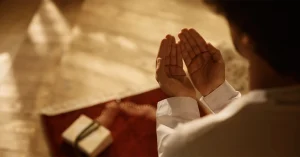DU‘A: THE WEAPON OF THE BELIEVER
Among the greatest gifts Allah ﷻ has granted His servants is the ability to call upon Him directly, without any intermediary. This act of turning to Allah in supplication known as du‘a is not just a ritual or a last resort in times of hardship, but a powerful weapon and source of strength for every believer.
THE STATUS OF DU‘A IN ISLAM
Du‘a holds a special place in Islam. Allah ﷻ says:
“And your Lord says, ‘Call upon Me; I will respond to you.’ Indeed, those who disdain My worship will enter Hell [in] humiliation.” (Surah Ghafir 40:60)
Here, du‘a is described as both a command and a form of worship. It is a means of drawing closer to Allah, expressing one’s dependence on Him, and acknowledging His ultimate power over all matters.
The Prophet Muhammad ﷺ emphasized its importance when he said:
“Du‘a is worship.” (Sunan Abu Dawood, Tirmidhi)
This shows that every heartfelt supplication, whether whispered in the depths of the night or uttered silently in the heart, is an act of devotion beloved to Allah.
WHY DU‘A IS THE BELIEVER’S WEAPON
A weapon is something that provides protection and strength in times of need. For the believer, du‘a serves this role in several ways.
First, it connects the servant directly to the Creator, bypassing all worldly barriers. No matter where a person is in hardship or ease, in solitude or among crowds Allah is always near to hear their call.
Second, du‘a shields the believer from despair. Even when solutions seem impossible, the act of raising one’s hands to Allah opens the door of hope. The Prophet ﷺ said:
“Nothing is more honorable to Allah than du‘a.” (Sunan Ibn Majah)
Finally, du‘a is a reminder of the believer’s true reliance. Wealth, power, and connections may fail, but the mercy of Allah never does. Through du‘a, the believer acknowledges that ultimate control lies only with Allah.
THE ETIQUETTES OF DU‘A
For du‘a to be most effective, the Prophet ﷺ taught certain etiquettes. One should begin by praising Allah and sending blessings upon the Prophet ﷺ, and then ask sincerely with humility and certainty in Allah’s response. Supplication should be made consistently, with patience, and not in haste.
Choosing blessed times, such as the last third of the night, between the adhan and iqamah, and on Fridays, increases the likelihood of acceptance. Similarly, making du‘a in sujood is highly encouraged, as the Prophet ﷺ said:
“The closest a servant comes to his Lord is when he is prostrating, so increase supplication therein.” (Sahih Muslim)
THE POWER OF PERSISTENCE
Sometimes, a du‘a is answered immediately; at other times, it may be delayed or stored as a reward in the Hereafter. The Prophet ﷺ assured us:
“No Muslim supplicates to Allah with a du‘a that does not involve sin or the cutting of family ties, but Allah will grant him one of three: either He will quickly answer his prayer, or He will store it for him in the Hereafter, or He will divert an evil from him of equal measure.” (Musnad Ahmad)
This means no du‘a is ever wasted. A believer should never give up, for every sincere supplication benefits them in ways seen or unseen.
LIVING WITH DU‘A
Du‘a is not limited to emergencies or moments of deep need. It should become part of daily life from waking in the morning, before eating, when leaving the home, in moments of joy, and in times of grief. This constant connection to Allah transforms the heart, keeping it soft, humble, and reliant upon Him.
CONCLUSION
Du‘a is truly the weapon of the believer. It empowers, protects, and brings peace to the heart. It is a reminder that no matter how heavy the burden, the believer is never alone, for Allah is always near. By holding firmly to this weapon, turning to Allah with sincerity, and persisting in supplication, a Muslim gains strength not just to face the trials of this world but also to earn closeness to Allah in the Hereafter.


